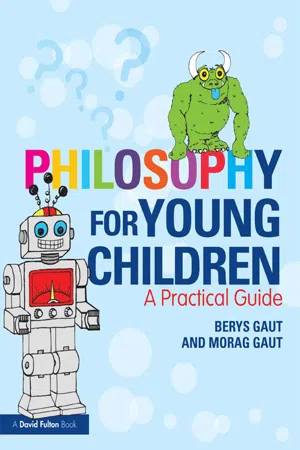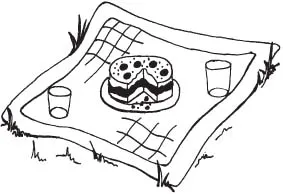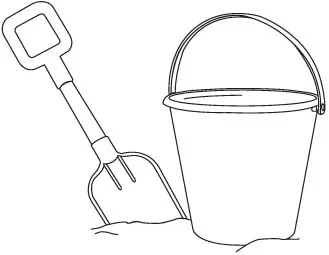![]()
Chapter 1
Political philosophy
Fairness and rules
THE TEDDY BEARS’ PICNIC
Philosophical topic
Political philosophy – fairness: equality versus need.
Aim
To get the children to discuss whether fairness is a matter of equality (equal shares) or distribution according to needs.
Props
• Two small teddies and one large teddy.
• A tablecloth, plates and a cake.
Story
The two small teddies are going to have a picnic. When they have found a shady patch of grass they spread out the tablecloth, set out the plates and put the cake in the centre. ‘How shall we share this cake?’ asks one teddy. ‘Well, let's share it fairly between us’, answers the other.
Question
In order to be fair how should the teddies divide the cake between them?
Story (continues)
The teddies decide that it would be fair to share the cake equally. Big Teddy, who is huge, is walking along and sees the picnic. ‘Hello, that looks like a delicious cake. Can I join your picnic please and have a piece of the cake?’ ‘Of course you can’, says one of the teddies. Big Teddy sits down and says, ‘I should have a bigger piece of cake than you two because I am much bigger and therefore I need more cake than you do.’
Question
Is it fair that Big Teddy has more cake?
If the children answer yes, ask them:
Why is it fair that Big Teddy has more cake?
Possible reasons:
• Big Teddy will be unhappy if he doesn't get more cake. Objection: the two teddies will be unhappy if he does.
• Big Teddy is bigger than the other two teddies, so he needs more food. Since he needs more food, it's fair that he has more. Follow up question: do you think that we should always share things so that people who need more are given more? E.g., if one child has a worse cold than another, he or she needs more tissues, so should be given more.
OR
If the children answer no, ask them:
Why is it not fair that Big Teddy has more cake?
Possible reasons:
• Big Teddy is being greedy. Objection: he's not being greedy, since he needs more food because he's bigger.
• All three teddies ought to have an equal amount of food, since we share things equally with other children. Objection: you are not very different in size but Big Teddy is much bigger than the two teddies and needs more food.
• If Big Teddy gets more cake he will be happy, but the two teddies will be unhappy; and it is better that two teddies are happy than if only one is.
• Things ought always to be shared equally.
Counterexample: you've said that it's not fair that Big Teddy has more cake. At tea-time do mum and dad have more food on their plate? Why is this? Is it because they are bigger and need more food? If so, it must be fair that Big Teddy has more cake than the other two teddies because he is bigger, like your mum and dad are bigger than you, so he needs more. Do you agree now that he should have more cake?
Summary
First, state the question we have discussed: we have been talking about how to share things fairly.
Second, summarise what the children have said. The possibilities include:
• Things should always be shared equally.
• Things should be shared according to need.
Follow up activity
Now divide the cake amongst the children and yourself. Use the principle that the majority of the children have agreed with. Maybe you will be lucky and get a bigger piece of cake than they do!
Alternative version
Twins have a birthday party. The twins take the place of the two small teddies and Jane, a taller friend, takes the part of Big Teddy.
GAVIN BUILDS A SANDPIT
Philosophical topic
Political philosophy – fairness and refusing to help.
Aim
To get the children to discuss whether it is fair not to share if someone has refused to help you, no matter what the reason for the refusal.
Props
• Gavin, John and David (dolls, pictures or cut outs).
Story
Gavin decided to build a sandpit in his garden. His mum said that he could use the stones in the corner of the garden to build the walls and she would buy him some sand. Gavin asked his friend John if he would help him to carry the stones and build the wall. ‘No, I'm too busy playing on my skateboard to help you’, said John. ‘But can I play in your sandpit when you've finished it?’ he asked. Gavin replied, ‘No, you can't, because you won't help me.’ So Gavin moved all the stones by himself and built the walls. He was very tired when he had finished.
Question
Do you think that it was fair that Gavin refused to share his sandpit with John?
If the children answer yes, ask them:
Why do you think it was fair for Gavin to refuse to share his sandpit with John?
Possible reasons:
• John could have helped him but refused to do so.
• Gavin did the work in making the sandpit but John didn't.
• John was being unfriendly in not helping him. Follow up question: is Gavin also being unfriendly in refusing to let John play in the sandpit?
• John was being selfish in not helping, since he wanted to play in the sandpit but didn't want to do the work in making it.
OR
If the children answer no, ask them:
Why do you think it was not fair for Gavin to refuse to share his sandpit with John?
Possible reasons:
• You should always forgive someone, even when they've refused to help you. Follow up question: does whether you should forgive someone depend on how much you needed help? E.g., if Gavin had hurt himself badly and John refused to help, should Gavin forgive John?
• John was his friend, so Gavin should have shared the sandpit with him.
Story (continues)
After having a rest, Gavin went to get the sand that his mum had just brought home. ‘I will need someone to help me lift this bag of sand into the sandpit’, thought Gavin. Just then he saw his next-door neighbour, David, in his garden and asked him to help with the sand. ‘No, I can't help because I have hurt my arm’, said David. ‘But can I play in your sandpit when you've finished it?’ he asked. Gavin replied, ‘No you can't, because you won't help me.’ Gavin struggled with the bag of sand by himself and managed to fill the sandpit. He then went into the house to collect his bucket and spade, and began to play in the sandpit on his own.
Question
Do you think that it was fair that Gavin refused to share his sandpit with David?
If the children answer yes, ask them:
Why do you think it was fair for Gavin to refuse to share his sandpit with David?
Possible reasons:
• Gavin did the work in making the sandpit but David didn't.
• David was being unfriendly in not helping Gavin.
• David was selfish in not helping Gavin. Objection (also to the reason above): David could not have helped because of his sore arm, so he wasn't being unfriendly or selfish. In contrast, John could have helped Gavin.
OR
If the children answer no, ask them:
Why do you think it was not fair for Gavin to refuse to share his sandpit with David?
Possible reasons:
• You should always forgive someone, even when they've refused to help you.
• David was his friend, so Gavin should have shared the sandpit with him.
• David had a sore arm...






